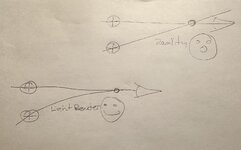nubraskan
Lil-Rokslider
- Joined
- Dec 9, 2023
- Messages
- 193
Now I understand what you're trying to say about windage, I didn't mention it because I did not realize what you were trying to point out, so apologies for unintentionally ignoring it but I haven't contradicted myself still to my knowledge. To answer your question though, for windage you're not moving your sight significantly for that factor. Your anchor wouldn't vertically but you would still have to vary the anchor pressure / distance against your face horizontally. It's the exact same scenario as the vertical adjustment but to a much lesser degree since you're not moving it nearly as significantly.You made a drawing stating you must change your anchor to accommodate the housing moving for elevation. You then stated moving the housing for windage doesn't need an anchor change. I've asked that contradiction to be resolved a few times
There ya go...
You are viewing the peep as a miniscule point that can only allow a view in the finest parameter oh however your brain works. It is not .000001 of a degree, it is at least 10 degrees of viewing angle. It is a hoop and not a micron of a dot that provides two cones of vision on each side of the peep rather a single line.
Did you solve for the degree of angle yet in the sight adjustment? We know that the peep allows at least a 10degree window, and we know the human eye can rotate vertically at least 120degrees, so we are still within the realm of possibility...
You can't solve for the angle without knowing all variables, and there is no need to anyways for the reasons I'll lay out below. I also understand what you're saying about the viewing angles. You're correct, peeps allow for varying degrees of angle allowance to account for different draw lengths, ATA lengths, and string rotation forgiveness.
Again, I also understand the peep isn't a perfectly miniscule point, but any misalignment of any amount between the target, front sight, and peep will cause the arrow to not hit perfectly behind your pin. The amount would obviously vary depending on the misalignment. Your peep and sight should always be a "circle within a circle" and centered as perfectly as you are capable of achieving.
Imagine the original situation I laid out above, if all else is initially fixed perfectly at the 20 yard target (sight, anchor, peep, etc), and you just slide your sight down with everything else in the same position, obviously your arrow doesn't change course. Your sight would be off on all targets, but because you maintained perfect alignment you would still hit the 20 and would hit low at 100. Next, you raise your bow up to realign the sight that you slid down earlier back on to the target, but let's keep your anchor exactly the same. This also raises your peep up slightly, correct? As your peep raise up slightly, it would look closer to a sideways venn diagram than a circle perfectly centered within a circle. Continuing on, since your eye can't vertically raise up, if you wanted to look through your peep now you would have to rotate your eye up slightly, as you mentioned. However, as you did that, you would see that your line of sight and peep is now not in line with the target or bow sight. Your eye which is now rotated to be aligned to your peep, would be looking above your target and slider sight. As you know, if your peep and sight are not framed together and coaxial, your arrow will not hit exactly where your pin is. So to move your peep back onto the coaxial line of your target and slider sight, you would have to move your anchor point down some distance. As you move your anchor position down, your peep would come back down into alignment and your eye can rotate back down onto the target and front sight.
Now, does your anchor point change enough for you to notice? Maybe not depending on your setup and how fast your bow is. At my house I can immediately go from 20 to 100+ yards, and it's definitely noticeable how much my anchor shifts because I shift targets without any setup (other than sliding the sight). How much of an anchor shift for me personally? It's about 1 finger width or slightly less.
Last edited:


